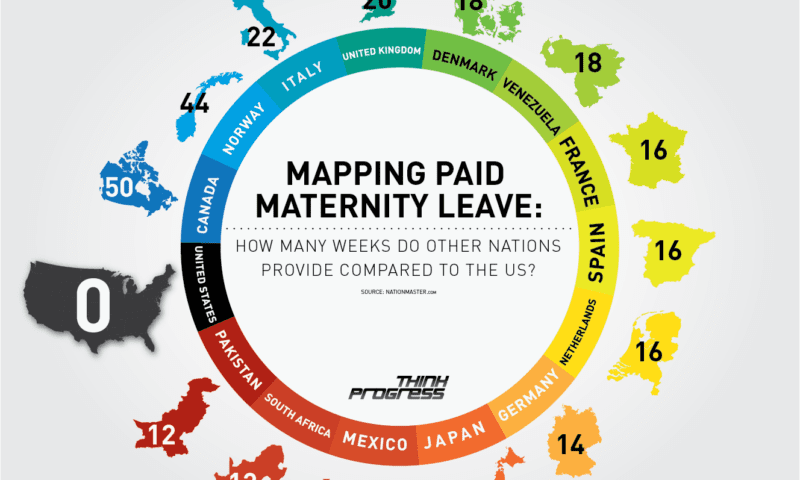
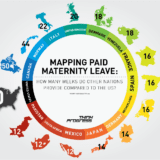
When we found out we were expecting twins in 2005, my husband was a teacher and I worked for a small non-profit. We were overjoyed but anticipated a tight squeeze in our small, two-bedroom apartment, where we lived with our 9-year-old son. We were lucky to live in California, where we could worry more about where to put twin cribs than how we would financially survive my maternity leave. That’s because, in 2002, California became the first state in the country to pass Paid Family Leave (PFL). This benefit has made a huge difference for thousands of families like mine who could not otherwise afford to take time off to bond with a new baby or care for a seriously ill family member.
Cassandra Engeman, author of a new policy brief, “Ten Years of the California Paid Family Leave Program: Strengthening Commitment to Work, Affirming Commitment to Family,” lauds the passage of Paid Family Leave as the first step toward filling a huge gap in public policy.
» Read more about: The Right to Care: State's Paid Family Leave Turns 10 »
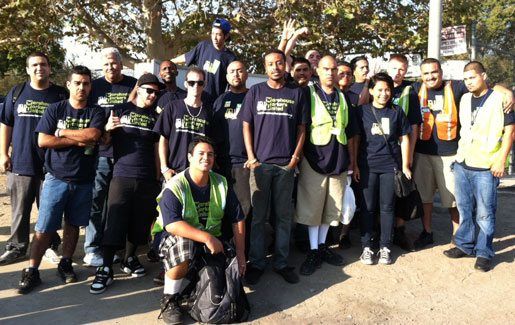

Workers at a Southern California warehouse that moves Walmart merchandise returned to work after a 15-day strike that included a six-day, 50-mile pilgrimage for safe jobs.
By midnight Friday morning, workers from all three shifts at the 24-hour facility returned to work after winning safety improvements on the job and drawing a response from Walmart about poor working conditions in its contracted warehouses.
“We no longer feel like we are working in the shadows,” said Carlos Martinez, a warehouse worker who went on strike and participated in the 50-mile WalMarch from the warehouses in the Inland Empire to Downtown Los Angeles. “We’ve never had this much attention on our working conditions and I have never felt this much support. I feel ecstatic going back to work and proud that we have all stood together as a team.”
Though Walmart initially dismissed workers concerns about conditions on the job as “unfounded,” by the end of the six-day march,
» Read more about: Inland Empire Warehouse Strikers Return to Work »


The opponents of the proposed Long Beach Living Wage are just getting organized. They’ve run an ad on Craigslist offering “a very competitive hourly wage” of $15 an hour to fight a measure that would guarantee a modest $13 an hour and five sick days for about 2,000 workers –housekeepers, cooks, dishwashers and janitors — who labor in the largest Long Beach hotels. I find it ironic that the opponents of Measure N themselves are offering more than the Living Wage proposal would mandate, clearly aware that $13 an hour isn’t a high enough wage to attract even part-time workers. Yet their campaign messages suggest the hotel Living Wage could do drastic damage to the city’s economy.
“We’re going to reach out to the residents of Long Beach at the grassroots level, neighbor to neighbor and relay our message- No on N,” says the job posting. If theirs were truly a grassroots campaign they would have plenty of community volunteers lined up to talk to Long Beach voters.
» Read more about: Long Beach Living Wage Foes Seek Backers on Craigslist »


Today’s body politic has no shortage of rhetorical bile, but no campaign attack ad comes close to matching 1988’s race-baiting Willie Horton commercial for sheer visceral partisanship.
Horton was a black murder convict who raped a woman and stabbed her male companion while on a weekend furlough from a Massachusetts prison. The ad — which showed a photo of Horton, with the words “raping” and “stabbing” flashing behind him – blamed former Massachusetts Governor and then-presidential candidate Michael Dukakis for Horton’s release. It is generally thought of as a low-water mark in American politics—stoking racial stereotypes in a Machiavellian push for victory at any cost. But it worked. Dukakis never recovered from the attack and George H.W. Bush went on to win the presidency.
Rather than facing censure, the political consulting outfit behind the Horton ad, the Dolphin Group, has thrived ever since.
» Read more about: The Dolphin Group: Prop. 32's Dark Messenger »
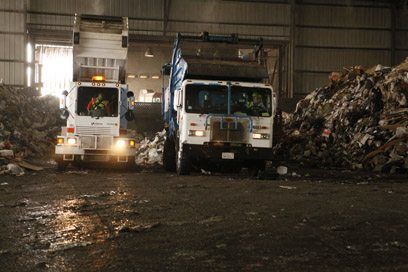

When you compare big business’ rationale for opposing an exclusive commercial waste franchise system with the proposal they’re pushing for now, the two are hard to distinguish.
Don’t Waste LA is calling for an exclusive franchise system to serve our businesses and apartment complexes, consistent with the path taken by 55 other Los Angeles and Orange County cities, along with San Francisco, San Jose, Oakland, Seattle and countless cities up and down the state. The coalition joins the City’s Bureau of Sanitation, the environmental community, waste experts and high-road haulers in arguing that exclusive systems are the only legitimate path for the city to reach its Zero Waste, clean air, job and health and safety goals.
On the other side, Angelenos for a Clean Environment (ACE), as pure an embodiment of “astro-turf” advocacy as has ever been seen in L.A., is a coalition organized by business lobbyist Cerrell Associates,
» Read more about: Hypocrisy or Incompetence? (What the Waste Wars Tell Us) »


» Read more about: Lalo Alcaraz: Proposition 32's Super Backers »


In case you missed it—and that seems unlikely—Monday night we saw the beginning of the end of a labor dispute, and it only cost about $500 million.
The dispute in question is what has been an unfair fight between the National Football League owners and 121 referees who were locked out before the season began. Replacement refs were hired and fans have been complaining about poor officiating for weeks.
Monday evening, those replacements blew an end of the game call, giving the underdog Seahawks a victory on the very last play. You can check out the video here, and you can get some good context from the excellent L.A. Times business columnist Michael Hiltzik here.
The story has led people down many paths. There’s the sex angle, since at least some of the replacement refs came out of something called the Lingerie Football League,
» Read more about: The NFL Referee Lockout: One Very Bad Call »


 Workers at a Southern California warehouse that moves Walmart merchandise filed a complaint with Cal/OSHA Monday detailing a high rate of injury associated with unreasonable quotas. They are seeking an immediate investigation of the facility.
Workers at a Southern California warehouse that moves Walmart merchandise filed a complaint with Cal/OSHA Monday detailing a high rate of injury associated with unreasonable quotas. They are seeking an immediate investigation of the facility.
The complaint, filed by Warehouse Workers United on behalf of two workers – one of whom is currently on strike to protest retaliation at the warehouse – documents repetitive lifting at extreme rates. These working conditions that have led to back injuries of multiple warehouse workers within the last year at an NFI warehouse in Mira Loma, California dedicated to moving Walmart goods.
According to the complaint filed with the California Division of Occupational Safety and Health against employers Walmart, NFI, and staffing agencies Warestaff and Select: “The workers who do this work are required to perform at an extreme rate under the pressure of managers who aggressively pressure workers to meet quotas with threats,
» Read more about: Walmart-Contracted Workers Charge High Injury Rates »


The Koch brothers entered California’s political fray September 14, a Friday, with a $4 million donation to a new pro-Proposition 32 political entity called California Future Fund. By Tuesday, September 18, the fund had released its first TV spot, titled “Telephoto.” What does $4 million in Koch cash buy? Let’s take a look at this half-minute spot, shot by shot.
00 min. 01 sec. – If we had millions of dollars of Koch brother money, maybe we could afford a telephoto lens too.
00:06 – Clearly not shot with a telephoto lens. Thematically, the scene should have been shot through the open window. Instead, our supposedly heroic cameraperson with a telephoto lens of moral clarity is physically inside the room with the shady suits. They look quite comfortable with his presence. A perfect metaphor for Prop. 32.
00:10 – “Big corporations and government unions control politicians,” our ominously-voiced narrator tells us.
» Read more about: Framed: Proposition 32's Deceptive TV Ad »
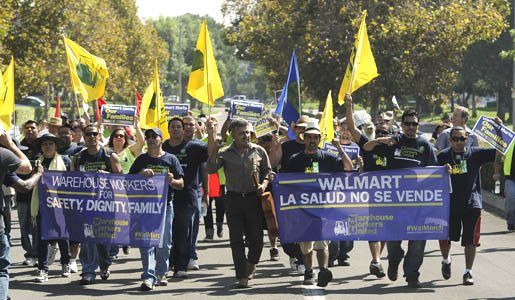

By the last mile through the grid in Downtown Los Angeles, the long, hot stretches of dusty San Bernardino County were a distant memory for 50 warehouse workers and supporters who marched 50 miles in six days from the Inland Empire to the city center.
Walking through the summer heat, warehouse workers who move Walmart merchandise took their protest for better working conditions out of the shadows in Riverside and San Bernardino counties and into LA. On the final day of the WalMarch, weary marchers, who slept on church floors and dined on the good graces of supporters, were met by hundreds of supporters on the steps of LA City Hall.
“We became a family along the way,” said David Fancote.
After several appeals to Walmart and its contractors to end retaliation and fix poor working conditions at one warehouse dedicated to moving Walmart goods in Mira Loma,
» Read more about: WalMarch Ends, But Warehouse Strike Continues »


 We all learn many important lessons from our parents. One lesson that I learned from my father was this: If you cut through a pipeline that’s carrying raw sewage you should be really, really sure that it’s not under pressure before you start. Unfortunately, this was something I discovered through actual observation when my father tried to fix our septic system and was sprayed down with a putrid stream of human waste as a reward for his efforts.
We all learn many important lessons from our parents. One lesson that I learned from my father was this: If you cut through a pipeline that’s carrying raw sewage you should be really, really sure that it’s not under pressure before you start. Unfortunately, this was something I discovered through actual observation when my father tried to fix our septic system and was sprayed down with a putrid stream of human waste as a reward for his efforts.
This is the type of home repair that I, now an Angeleno, never need to make on my own. Because I am currently a fancy city-dweller, I no longer have to take my trash to the dump, fix potholes in the road or do all of the other chores that are part of everyday country life but are magically taken care of when one lives in the city.
Not only do I get to avoid these day-to-day chores,


NRDC [Natural Resources Defense Fund] and Move LA released a report today touting the expansive benefits of sustainability planning in three of California’s largest cities—representing nearly two-thirds of the state’s population. The report explores how Los Angeles, Sacramento and San Diego are already building the cities of the future thanks to the Sustainable Communities and Climate Protection Act, or SB 375, authored by Senator Darrell Steinberg in 2008.
Four years ago, SB 375 was nothing less than a revolution in the way California plans for growth. It linked regional transportation planning to reducing greenhouse gas emissions, encouraging a wide range of travel options and giving Californians the kinds of communities they want.
Our analysis found that enacting SB 375 into law was an achievement that distinguished California as a national leader in creating communities that meet both our economic and environmental challenges.
» Read more about: SB 1156: A New Tool for Sustainable Development »

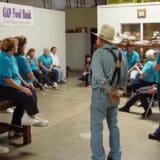
The U.S. Census Bureau released the American Community Survey yesterday, and the broad study of poverty, inequality and youth mobility failed to present strong evidence that the recession has fully subsided. Instead, the study tells a familiar tale of winners and losers in the wake of the recession.
According to the report, poverty increased between 2010 and 2011. NPR reports on the findings:
The number of Americans living in poverty grew to 15.9 percent in 2011. It was 15.3 in 2010. That means that 48.5 million Americans had an income below the poverty level.
Poverty increased by greater margins in the three years prior, but the uptick, however slight, casts real doubt on an economic turnaround. Notably, an additional 2.3 million would have fallen into poverty without 2011′s extended unemployment benefits, and the poverty rolls could expand as jobless benefits expire.
In addition,
» Read more about: Recession Still Very Real for Americans »


Many of you have been following LAANE and its partners’ effort to protect Chinatown from Walmart, which is pursuing a strategy to get into urban areas across the country including Boston, New York, Washington, DC and Chicago. Over the last six months, thousands of people in L.A. have marched against Walmart, community groups have appealed their building permits and a moratorium on large chain stores in Chinatown is pending. Across the nation, Walmart workers have organized creative actions against Bentonville shareholders and community groups have launched rallies and even flash mobs to hold the retailer accountable.
Yet many here in L.A. fear it is not enough to stop Walmart. After all, Walmart was able to get its building permits issued by a department known for moving slower than a glacier less than 24 hours before a looming moratorium. And why did they need those expedited permits—was it really that urgent to begin construction on a Walmart store in a space that had been vacant for 20 years?
» Read more about: Brooklyn Tells Walmart to “Talk to the Hand” »


 In 15 days, food stamp benefits will be cut by some 20 percent, thanks to Republicans in Congress who tossed this mean-spirited gem into one of GOP’s hostage bills that President Obama was forced to sign because a veto would result in the government shutting down, or the US reneging on its bills, or something equally destructive.
In 15 days, food stamp benefits will be cut by some 20 percent, thanks to Republicans in Congress who tossed this mean-spirited gem into one of GOP’s hostage bills that President Obama was forced to sign because a veto would result in the government shutting down, or the US reneging on its bills, or something equally destructive.
On October 1, millions will see their benefits stripped away or cut greatly.
Most unemployed people will get cut off. Many working poor, who rely on food stamps to make ends meet, will go hungry. So, too, will countless military families – a separate disgrace in and of itself. Far too many homeless families and individuals will find their chair at the dinner table yanked away just as they are sitting down to eat, a sight gag that hasn’t been funny since it was pulled on Fatty Arbuckle in some of his movies back in the Twenties.
» Read more about: Food Stamp Cuts on the Line in Congress »


 Political money is a featured dish on the spending menu of Tampa-based Outback Steakhouse restaurants. The chain was controlled by Bain Capital until last month, when its parent, Bloomin’ Brands, went public in an Initial Public Offering. Bain and its investors stand to earn an estimated 88 percent return on their investment in the company.
Political money is a featured dish on the spending menu of Tampa-based Outback Steakhouse restaurants. The chain was controlled by Bain Capital until last month, when its parent, Bloomin’ Brands, went public in an Initial Public Offering. Bain and its investors stand to earn an estimated 88 percent return on their investment in the company.
Almost everyone now knows Bain’s critical role in building Mitt Romney’s wealth as a leading light of the 1 percent. And, Ann and Mitt Romney are investors in the particular Bain fund that bought and then sold Bloomin’ Brands.
But few noticed that Outback’s Political Action Committee (OSI PAC, also known as OSI Restaurant Partners) this year emerged as the restaurant industry’s biggest political donor. So far in 2012, OSI PAC has given more money to political candidates than the PACs of any of these bigger and better known firms: Coca-Cola, McDonald’s, Pepsi,
» Read more about: Low-Wage Sizzle: Outback Steakhouse PAC »


Why does California reward ultra-rich companies that move jobs out of the state?
We’ll tell you why. In 2009, during secret, behind-closed-doors budget negotiations, a handful of state legislators and Gov. Schwarzenegger snuck in a colossal but little-known corporate tax giveaway into the budget in the dead of night. This loophole, known as the “elective single sales factor,” gives corporations the option to reduce the taxes they pay to California by keeping jobs and investment in other states – giving companies a huge incentive to hire outside of California. The loophole has already cost the state tens of thousands of jobs, and the only ones who are benefitting from it are California’s richest corporations. In fact, 80 percent of the benefits from this loophole go to the 0.1 percent of California corporations with gross incomes over $1 billion.
It’s high time we end the practice of shelling out taxpayer money to ultra-profitable companies that kill California jobs.
» Read more about: Proposition 39: Bringing Jobs Back to California »
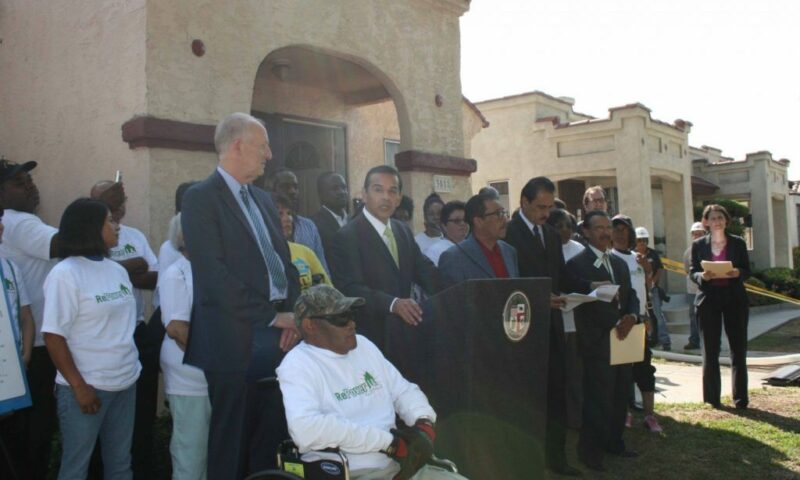
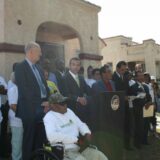
Los Angeles, long fighting its reputation as one of the least green cities in the country, is making real changes to improve its standing.
City leaders and members of RePower LA gathered Monday, September 17, to recognize the City’s major strides in energy efficiency. The event took place at a South L.A. home while workers demonstrated an energy efficiency upgrade on the residence. It was part of a Department of Water and Power (LADWP) program championed by the RePower LA coalition. Mayor Antonio Villaraigosa, City Council President Herb Wesson, Councilmember Richard Alarcon, DWP General Manager Ron Nichols, business leaders and residents each spoke about the importance of energy efficiency and job creation, particularly in the current economy.
 “We’re proud to announce a renewed commitment to energy efficiency from the Department of Water and Power,” said Mayor Villaraigosa. “DWP has proposed to more than double its energy efficiency budget.
“We’re proud to announce a renewed commitment to energy efficiency from the Department of Water and Power,” said Mayor Villaraigosa. “DWP has proposed to more than double its energy efficiency budget.


 How different would California look with Proposition 32’s passage? To imagine, it’s not necessary to focus on a Golden State without the legacy of its unions, but rather to think of a California in which only the rich and powerful have a say in Sacramento and in the polling booth.
How different would California look with Proposition 32’s passage? To imagine, it’s not necessary to focus on a Golden State without the legacy of its unions, but rather to think of a California in which only the rich and powerful have a say in Sacramento and in the polling booth.
“It will have a devastating effect,” says John Logan, director of Labor Studies at San Francisco State University, of Prop. 32’s impact. “California would be transformed as a state.”
On environmental issues alone, Prop. 32 stands to roll back decades of progress in making California a global leader in green policy-making.
“You don’t have to go very far back to find likely examples of how it would change California,” Logan says, adding that Prop. 32 would remove labor’s voice from nearly all political conversations.
That voice is not always confined to lobbying efforts in the state legislature.
» Read more about: If Proposition 32 Passes: A Not-So-Green Golden State »
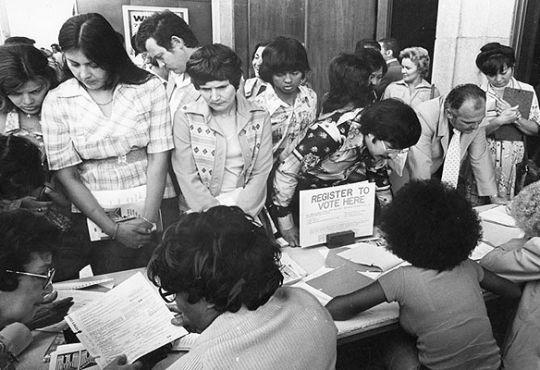
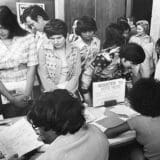
This Thursday the L.A. Library Foundation’s ALOUD program hosts a panel discussion about the possibility of thawing America’s internal cold war in political discourse. The Advancement Project‘s Connie Rice joins U.C. Irvine Professor Rick Hasen (this year’s go-to man on political polarization), along with KPCC immigration correspondent Leslie Berestein Rojas, Young Republican leader Nicole Stygar and USC/Norman Lear Center chair Marty Kaplan to answer the question, “The Voting Wars: How Do We Move Beyond Partisanship and Polarization—or Should We?”
The discussion promises to be lively and enlightening – with the delicious possibility of shouting matches and chair-throwing. (Just kidding.) Like voting itself, the event is free, but reservations are necessary by visiting ALOUDS’s site or calling (213) 228-7025.
Mark Taper Auditorium-Central Library, September 20, 7:15 p.m.
» Read more about: Poles Apart: Can Consensus Exist in America? »